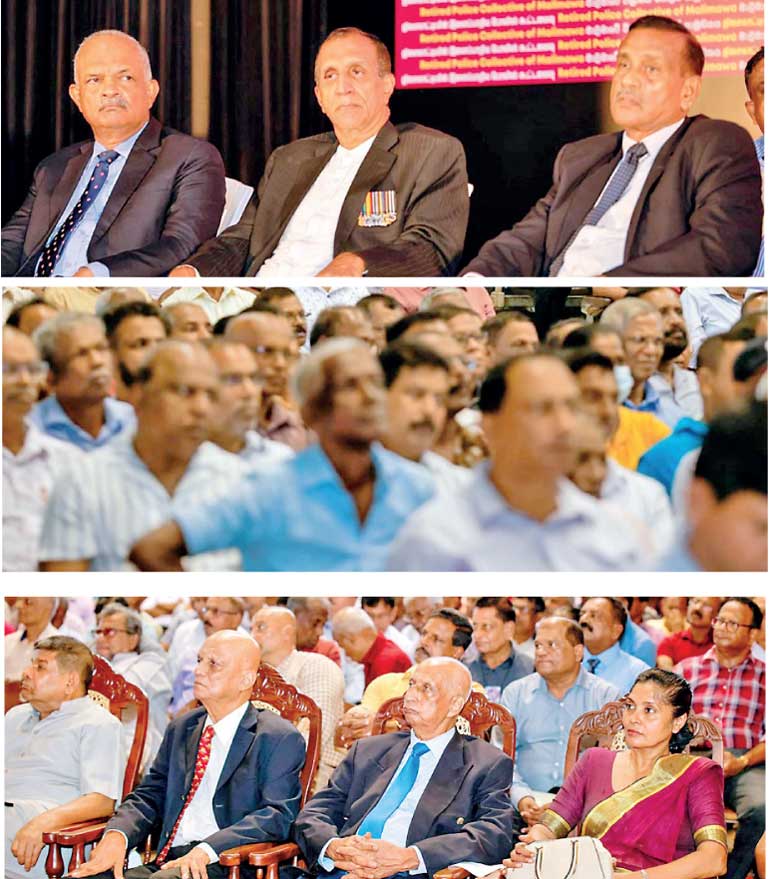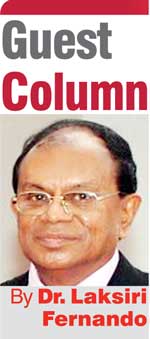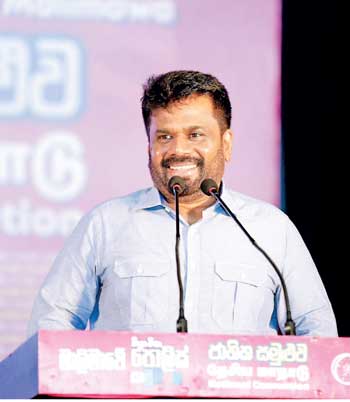Monday Feb 23, 2026
Monday Feb 23, 2026
Thursday, 13 June 2024 00:10 - - {{hitsCtrl.values.hits}}

 Anura Kumara Dissanayake’s (AKD) speech as the Leader of the National People’s Power (NPP) at the National Convention organised by the Retired Police Officers Collective on 9 June 2024 is quite promising in terms of establishing or reestablishing rule of law in the country, if they get the opportunity to govern the nation. They have been talking about a ‘system change’ now for some time, and various independent critics and observers were asking the details of this promise, without merely depending on the slogan.
Anura Kumara Dissanayake’s (AKD) speech as the Leader of the National People’s Power (NPP) at the National Convention organised by the Retired Police Officers Collective on 9 June 2024 is quite promising in terms of establishing or reestablishing rule of law in the country, if they get the opportunity to govern the nation. They have been talking about a ‘system change’ now for some time, and various independent critics and observers were asking the details of this promise, without merely depending on the slogan.
I was fortunate to listen to this speech online and live, through ‘Horawa News,’ and one weakness or wrong that I immediately observed was its leading phrase ‘Malimawa shows its police power.’ I have no idea about who runs the ‘Horawa,’ but that was not what AKD was quite obviously advocating. ‘Power’ is not a good word to use in democracy, worst still is the ‘police power.’
State of the State
After an introduction, AKD ventured to explain the ‘state of the State,’ particularly during the last two three years, characterising it as a failed State with inability to pay back loans, to supply necessary medicine to hospitals, and failing to give children a proper education, and when they grow up, proper employment. He strongly characterised the State as in the grips of crooks and criminals (dushithayan saha aparadakaruwan), and the whole society being affected by this situation. He said, “This must be changed, and this to be changed like in all other changes, Sri Lanka should be a State based on rule of law.” Thereafter his speech focused, in detail, on the questions of rule of law. There were several principles that he enunciated.
 First, equality before the law. All citizens in the country should be equal before the law. All citizens in the country should be able to go before the law against any discrimination by the implementation of law. He asked, “Are we all equal before the law? No. Rich people have one law, and people who have political power have another law. At present, the Department of Police, the Attorney General’s Department and even the Judiciary have become a laughingstock. Let me ask you a question that I have asked once before.”
First, equality before the law. All citizens in the country should be equal before the law. All citizens in the country should be able to go before the law against any discrimination by the implementation of law. He asked, “Are we all equal before the law? No. Rich people have one law, and people who have political power have another law. At present, the Department of Police, the Attorney General’s Department and even the Judiciary have become a laughingstock. Let me ask you a question that I have asked once before.”
“Who knew best that Diana Gamage didn’t have citizenship? First, Diana. She knew that she came to the country on a tourist visa and even that visa period was over. Knowing all that, she came to Parliament. Knowing that, she also acted as a state minister. How did she do that? She knew that because of her political power that the law would not apply to her. An ordinary village person even will not ride a bicycle without a license. Where is our law?”
“The second person who knew well was Ranil Wickremesinghe. But he protected her. This type of country cannot go forward. We need a state system which is entirely based on rule of law. I will give you an assurance. I personally or our movement do not have any financial fraudsters or criminals to protect. No underworld, no drug dealers, no rapists, no financial fraudsters, and no criminals to protect. If the existing powers given to the police to curtail these crimes are not enough, under our government, we will create circumstances to strengthen the police.”
Political interferences
AKD outlined some of the crimes and murders which were investigated, and the perpetrators were properly punished within the system. Those included the murder of the Manager of Noori Estate, Hokandara family killing, killing of Sarath Ambepitiya, etc.
On the other hand, he emphasised the cases like Lasantha Wickrematunge, Eknaligoda murder, assault of journalists like Keith Noyar, Poddalla Jayantha and others that dragged on without a conclusion. Why? His correct answer was political interference. He praised the police but emphasised political interferences that hamper their tasks.
One of the aspects that he neglected was the ethnic bias in criminal investigations and other police matters. Will this be addressed by the NPP? That is my question. For example, I have known J.S. Tissanayagam as a student at Peradeniya University who later became a prominent Tamil journalist. He was abducted, beaten up, and charged under the Prevention of Terrorism Act. There are so many similar cases that were neglected by AKD, and I hope he will rectify his neglect in the coming future. I also failed to identify any Tamil participation in the crowd at the retired police convention.
AKD was correct in emphasising that the police have a major role in maintaining stability in society. “If there were no police, no one would be able to pass the Borella junction peacefully” he said. He emphasised correctly, that these premises were established after a long struggle in building up rule of law in society internationally. “These were not there in tribal societies,’ he pointed out. “The leader of the tribe (Rahe nayakeya) did all together,” he said. ‘It was through struggles that separation of powers was established between Parliament to legislate, elected Presidents to execute, and the Judiciary to rule on justice,’ he continued.
“What we can see today is a tendency to go back to tribal society. We need a civilised society. Especially the department of police, criminal investigation and the attorney general’s department should work independently, efficiently and correctly. It is our task under an NPP government to create these civilised conditions. Today the police department is in a mess due to political interferences.” He gave examples.
“Do we have a proper procedure in recruiting and promoting police officers? No. I know that there are some officers who are constables at recruitment, and also when they retire. We will establish a proper procedure in recruitment and promotions. At present, when change of governments occur, the police officers are punished or promoted. The main task of the police officers is people’s security. However, what they are supposed to do today is patrician (prabhu) security.” He mentioned that he has been an MP since the year 2000 and never sought any police security. He emotionally mentioned the difficulties that police security undergoes with so many difficulties.
Political abuse
of Police service
“Under our Government, people’s security is the primary task of the police, and not politician or patrician security. During the last 24 years as an MP, I have never called the police for any assistance. But this is not the case with other MPs. However, I have to say that to eliminate and curtail criminals and fraudsters, we will give the police the necessary leadership and encouragement. Today, the MPs consider the police as their servants. I have heard some saying ‘my OIC’ (mage OIC). This is not our attitude. We will preserve the dignity of police officers. They are well trained and educated. They should not be the tools of politicians. Their task is to punish criminality, present and past. There are people who believe their past offenses will be forgotten. But we will not forget.”
AKD related a story. “During the election campaign in 1994, Chandrika Kumaratunga accused the UNP stealing people’s money and property, under their 17 years government. Vijayapala Mendis has obtained 75 acres of coconut land for two rupees per acre, altogether for Rs. 150. She promised that these crooks would be ‘skinned of their skin’ (hama gahanewa) at the Galle Face Green. People rejoiced and clapped. However, within seven years, the same Vijayapala Mendis became a Minister in Chandrika’s Cabinet. There are so many examples like that. Perhaps she had forgotten and even the people had forgotten. Ranil Wickremesinghe who accused [Gotabaya Rajapaksa] as the ‘Mastermind of the Easter attack’ also became the President based on the same Gotabaya mandate.”
“Politicians use the people’s anger against crime and robbery as slogans in political platforms. Like balls to gain goals. But don’t do anything after coming to power. I once asked Ranil Wickremesinghe in Parliament whether he can forget about the murder of Lasantha Wickrematunge easily. There was no reply. Lasantha wrote against us and others to support Ranil. But after Ranil came to power he always forgot about Lasantha. This is the type of politics that we have from traditional political parties and leaders.”
He went on: “That is why I say, under an NPP government these crimes, murder, robbery, bribes and shameful history will not be forgotten. For these purposes, there are people with experience and information who can professionally handle these efforts. We are not just shouting. We have planned properly and organised properly, even if changes are necessary in the existing law, we will make the necessary changes. We also have an idea who should be assigned to these tasks. We take the responsibility to make our State free from crime and theft based on rule of law.”
“We have a long story about the development of the country. How to manage the economy, how to change education, how to change the health system, and how to improve the transport system. On all these matters we have set plans. We have plans on how to uplift the poor people in the remote areas. However, all these should be based on a properly functioning society anchored in rule of law without crime and theft. All these economic plans and programs would not make sense if the country were chaotic without law and order.”
A new vision?
In the above context, AKD had something new to talk about the link between ‘rule of law and economic development. “The development and progress of the country would entirely depend on rule of law, law and order and equality before the law. This is the foundation of any economic development. Look at the developed countries. Do you know any developed country without law and order or rule of law? This is why I request you, the retired police officers, and the serving officers to support this effort. This is not a request to get them into politics. No. But to get them involved in establishing a rule-based country and a state.”
There have been various discussions in the country why Ceylon and Sri Lanka failed to develop the country and the economy during the last 75 years after independence.
The countries which were behind us like Malaysia, Singapore, South Korea, etc. have progressed extremely well. There have been several explanations given focusing mainly on economic factors and policies. However, for the first time, AKD as a politician, has come up with a different interpretation for the economic backwardness of the country, focusing on ‘rule of law, law and order, and equality before the law’ without neglecting economic factors or other influences. Because this backwardness or underdevelopment is also about democracy, human rights, and political/constitutional structures.
Undoubtedly, there were certain limitations to the scope of his speech. Otherwise, he should have mentioned ethnic discrimination, conflict, and war, as part and parcel of the breakdown of ‘law and order’ apart from crime and corruption.